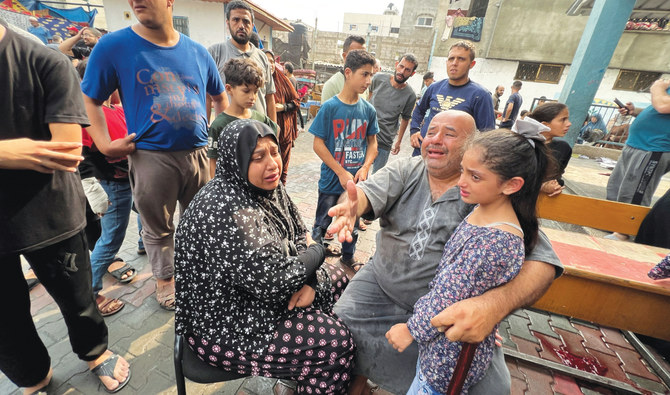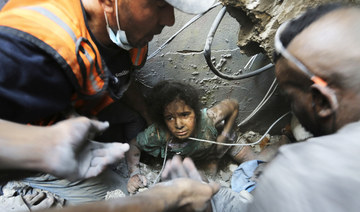BEIRUT: Israel expanded its evacuation warnings to new areas of Lebanon on Thursday as Caretaker Prime Minister Najib Mikati warned that the short-term outlook for his country “remains bleak.”
His comments came as US envoys Amos Hochstein and Brett McGurk met Israeli Prime Minister Benjamin Netanyahu in Jerusalem.
Israeli orders for Lebanese civilians to evacuate large areas of Tyre and Baalbek were condemned by Mikati as an “additional war crime,” adding to the “series of crimes of killing, destruction and sabotage committed by the Israeli army.”
In response to Israel’s expansion of its air campaign, Mikati “requested increased pressure on Israel” from international and diplomatic bodies.
Hochstein reportedly told Mikati on Wednesday that he would urge Israel to end its campaign in return for a Lebanese commitment to implementing Resolution 1701.
As Lebanon awaited a diplomatic response, Israel’s Channel 12 said that the Israeli army is preparing to expand its ground operations in Lebanon “as negotiations might take time.”
Israeli attacks intensified in south Lebanon and the Bekaa region, with evacuation warnings extending to the Rashidieh Palestinian refugee camp in Tyre and civil defense centers in Baalbek.
The Israeli army warned residents of several southern towns, including the Rashidieh camp, to evacuate north of the Awali River.
The order sparked panic among the camp’s 323,000 residents, triggering mass displacement of people who had few options for shelter.
A similar event took place in the Baalbek region a day earlier as tens of thousands of Lebanese fled their homes following warnings of imminent Israeli bombardment.
This warning was repeated on Thursday, preventing the return of residents.
Many spent the night in their cars in harsh cold weather as nearby town shelters reached capacity from earlier evacuees.
Some residents sought shelter in the historic Baalbek Castle, assuming the site had international protection status, but Baalbek Gov. Bashir Khodr advised against this, warning that the castle fell within the “red zone” designated by Israel as a potential target.
Israeli army spokesperson Avichay Adraee, in a new warning posted on X to people in Baalbek, Ain Bourday and Douris, said that residents of the three areas “are staying in a combat zone in which the Israeli army intends to attack.”
Israeli strikes later hit border areas in northern Bekaa and across the Syrian border, a common route for illegal crossings.
An airstrike in Bodai destroyed a home and killed its four inhabitants.
About 10,000 airstrikes have hit Baalbek in the last two days, killing about 70 people and injuring more than 500 others.
Israeli raids targeted an Amal Movement ambulance in Zefta and a civil defense center affiliated with Hezbollah’s Islamic Health Organization on the highway between Dardagia and Arzoun in southern Lebanon.
The strike killed a paramedic and injured two others, bringing the death toll of health workers in Lebanon to 174, with 279 wounded.
Israeli drone attacks against cars and motorcycles in southern Lebanon and western Bekaa continued on Thursday.
A car on the Araya-Kahala road was struck, killing two and injuring one.
On Wednesday, an Israeli drone struck a car on the same road, killing its driver, who was transporting anti-tank missiles.
A drone also struck a car on the Al-Amariyeh-Naqoura road, killing its driver, a Lebanese Army soldier.
A motorcycle rider was killed in the town of Qaraoun located in the West Bekaa region.
Meanwhile, Israel’s air campaign escalated across south Lebanon, targeting residential homes and neighborhoods. A missile struck a man’s home in Ebel El Saqi, injuring his eight-year-old granddaughter.
The town of Chihine was hit with Israeli white phosphorous artillery shells, while the Israeli army blew up four houses in Alma Al-Shaab, a town adjacent to the Blue Line.
A residential building in Aita Al-Shaab was also struck from the air.
On Wednesday evening, the Israeli army destroyed the only mosque in the border town of Boustane, along with several houses in the border town of Al-Dahira.
A new video showing extensive destruction in the southern border town of Kfar Kila was shared. All of the town’s buildings and houses had been leveled.
In a statement, Catherine Russell, UNICEF’s executive director, warned: “At least one child is killed and 10 injured daily in Lebanon.
“Thousands more children who have survived the many months of constant bombings are now acutely distressed by the violence and chaos around them.”
Clashes on the ground between the Israeli army and Hezbollah continued on Thursday across the border region.
Hezbollah-affiliated Al-Manar TV reported that “violent clashes” took place east of Khiam, with militants repelling an Israeli incursion into the area.
Clashes near the border town have continued for three days following an Israeli assault.
UNIFIL spokesperson Andrea Tenenti said that the international force had been targeted more than 50 times since the beginning of the conflict.
Seven of these attacks were “carried out deliberately by Israel,” he added.
Israel claimed it had killed Mohammed Khalil Alian, the commander of the anti-tank force affiliated with Hezbollah’s Nasr unit, in Burj Qallawiyah.
On Wednesday, Israel’s air force claimed the elimination of a Hezbollah air defense cell that had launched a missile at an Israeli aircraft in the region north of Tyre.

























